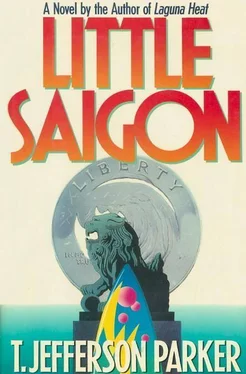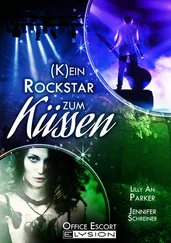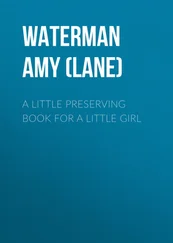T. Jefferson Parker
Little Saigon
They of the west are appalled at his day and horror seizes them of the east.
— JOB 18
I would like to thank the following people for their generous help in writing this book.
Many thanks to Wendy Asano, whose Saigon Cabaret in Garden Grove, California, served as a great inspiration — anyone who goes there will know why. I would like to thank Wendy, her daughter Rebecca, and son Jeff for hours of hospitality, good music, and good company.
Westminster Police Officer Dennis Gabrielli showed me the streets of Little Saigon and suffered my questioning presence in his patrol car more than once. I hope that his sense of humor and of fair play at least partially found its way into this story.
Detective Marcus Frank of the Westminster P.D., a specialist in Asian-American crime in southern California, was a candid and authoritative source of information.
Garden Grove Police Officer Mark Hutchinson showed me his beat in Little Saigon through the eyes of a young and capable patrolman.
I would also like to thank attorney Carolyn Malone of Immigration Law for taking me under her benevolent wing and introducing me to so many formidable and fascinating members of the refugee community of Orange County.
Thanks too, to the various workers of the National United Front for the Liberation of Vietnam, who spoke to me with openness and hope regarding their efforts to reclaim their homeland. One can only wish them well.
I also thank Donald Stanwood for his incisive reading of this novel in manuscript, and for his unfailingly good advice on what to leave out.
Last but not least, I thank Jared Kieling of St. Martin’s Press, whose guidance was invaluable.
Whatever truth this book contains is theirs; the mistakes and misjudgments are mine alone.
— T. JEFFERSON PARKER
April 1988
Laguna Beach
Chuck Frye, former second-best surfer of Laguna Beach, gazed through his windshield and saw no six-foot waves.
Instead, Laguna Canyon Road sped toward him in the darkness, its yellow stripe wavering, eucalyptus trees whisking past the beams of his skewed headlights.
Scenes from the last forty-eight hours played in his mind — fragments of a weekend abandon that was reckless far beyond the limits of common sense. It began as an epic debauch and things went downhill fast. It was exactly what he wanted. The time is nigh, Frye thought, to get myself together.
He sat up straight, took a deep and dizzying breath. How many motoring souls have met their maker on this road? he wondered. In his own lifetime it seemed like a million: busloads of tourists colliding with cement mixers, sports cars slamming into each other head-on, bikers wrapping themselves around power poles while their machines scattered fireworks across the hillsides. And always the orange outlines of the bodies, sprayed by the police to mark the final attitude of the departed.
Frye signaled contritely and made a left turn onto Canyon Oaks Drive.
The old Mercury rumbled past the nursery and body shops, then past the rickety little houses clustered in the darkness. The moon and a distant streetlamp shone on beat-up cars, toolsheds of odd design, drooping clotheslines. A cat ran through three gradients of shadow, then vanished under a pickup. A stand of plantain drooped with malarial laziness, while beside it a wall of honeysuckle gave off an aroma that made everything seem even warmer than it was. Laguna Beach — art colony, tourist trap, a piece of attempted Eden crammed between the hills and the ocean, hippies in the sixties, cocaine in the seventies, AIDS in the eighties, a representative Southern California beach town.
Nimbly executing a hairpin left, Frye gunned the Cyclone up a straightaway so vertical that the sky became a dashboard of whirling needles. Then the stars rushed back into place as he plopped level, narrowly missing the mailbox he had knocked over months ago and that now lay door-up in the ivy in front of his cave-house. He worked himself from the car, wrestled his mail from the box and advanced on his front door. “Home,” he mumbled. “Frye one, Visitors zip.”
The cave-house stood before him, a dark lump against a dark sky. It was built into a hill overlooking the city, facing west. Fumbling with his keys, Frye marveled again at the frankly weird history of the place — the gist being that one Skippy Sharp had paid a contractor to build a house in the great sandstone outcropping, then had run out of money when the project was only half finished. Skippy had lived in it for a few months before disappearing forever into Mexico, so the contractor himself took it over, then Sharp’s mother somehow got control of the thing and rented it in succession to a painter, an architect, a fish breeder, a child-molester, a nurse, then finally to the former second-best surfer in Laguna. Not long after he had rented it, Frye learned that the land had been bought by his own father, the venerable Edison Joseph Frye, thereby adding this tiny piece of ground to the vast Orange County Frye Ranch. Mrs. Sharp still “managed” the property, raising Frye’s rent often and with gusto, believing, he concluded, that his family fortune warranted such outrage. It was, in fact, a cave-house — with back rooms being nothing more than dark irregular caverns. But the living room, bedroom, kitchen and bath featured walls, electricity, and unimpeded views of the Pacific. Frye’s friends said that the cave-house was like Frye himself: half-finished, prone to dark recesses. At any rate, it was home.
He stood in the living room and felt the floor rotating under him, an illusion he explained away as the spinning of Earth on her axis. He went straight to his answering machine. Frye attended to this gadget with devotion, hopeful that some huge improvement might be in the offing.
Linda called to say she had filed Friday.
Dr. Redken’s office called: scan results in.
Bill Antioch at the MegaShop called to tell him about the Masters Invitational Surf Contest at Huntington Beach.
The last message was from Bennett. “Hope you haven’t forgotten the birthday thing at the Wind. Li wrote a song for us. See you there about ten, little brother. Saigon Days is still going on — that civic party — so I’ll save you a seat. That’s today, Sunday, in case you forgot.”
Frye checked his watch but it was gone. He fumbled for a light switch, knocked over a stack of résumés he’d just had copied, then consulted his MegaShop surf calendar. It was still turned to February because of the whopping Hawaiian wave pictured there, tubular and perfect as Jack Lord’s hair. Flipping to August he confirmed that this was Sunday — Bennett’s birthday and, of course, his own.
He gathered up the résumés, wondering if the Register would call him. The Times had turned him down for lack of five years’ experience in daily-news reporting. He’d sent a résumé and a snappy cover letter to every newspaper in driving distance. He hated writing those letters more than anything on Earth.
Frye called time, made a cup of coffee, dumped in some milk and went outside. Feeling festive on this, his thirty-third birthday, he put down the convertible top and set out for Little Saigon.
Back out Laguna Canyon Road, up the San Diego Freeway, a warm summer night filled with redolent intervals of strawberries, oranges, asparagus, smog.
Thoughts of Linda — filing Friday — rushed his mind, but Frye countered them with the radio news and images of his weekend bacchanal. His marriage had lasted five years. In the end it had shot downward with an almost ballistic velocity. He assumed he had asked for it. Linda, he thought, I can’t face you now, love.
Читать дальше












